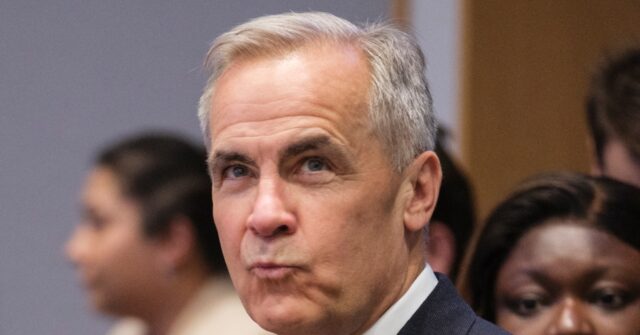Canadian Prime Minister Mark Carney described his country’s trade negotiations with the United States as “intense” and “complex” on Monday, failing to express confidence the parties would meet the August 1 deadline for an agreement to prevent Washington from imposing a 35-percent tariff on Canadian goods.
The gloomy disposition from the prime minister on a potential American deal follows President Donald Trump suggesting that it was possible Canada and the United States did not broker a deal at all, the situation instead remaining as Ottawa accepting the tariffs, which would significantly damage the profits of many Canadian businesses. Carney himself had warned two weeks ago that he was not sure it would be possible to convince Trump not to impose tariffs on Canada. Now, Carney appeared to suggest that he would not be able to convince Trump to sign onto any new agreement at all.
The concession is of utmost political significance as Carney won a special election to replace predecessor Justin Trudeau by campaigning to stop Trump’s tariffs and defend the economic interests of Canada. Carney claimed – despite Trump endorsing him in the election and disparaging Conservative rival Pierre Poilievre – that he would be a more formidable negotiator on tariffs with the United States than Poilievre and successfully made challenging Trump a primary issue on the campaign trail.
Three months after the election, Carney appeared ready to concede he would not be able to change Trump’s mind on his approach to business with his country.
“The negotiations are at an intense phase,” Carney said on Monday, according to the Canadian outlet Global News. “It’s a complex negotiation you see with the various trade deals that have been agreed by other jurisdictions … there are many aspects to these negotiations.”
“We’re standing up for Canada. The United States and Canada can do many good things together, we have done that in the past, we can do more in the future but on fair terms for our country,” he asserted.
RELATED: “Canada Only Works as a State” — Donald Trump Refuses to Back Down on Canadian Tariffs
Carney described reaching a trade agreement at all as a possibility, rather than a certainty, by the August 1 deadline.
“There is a landing zone that’s possible, but we have to get there, and we’ll see what happens,” Carney posited, according to the Globe and Mail.
Trump began a global overhaul of America’s trade relationships in April, announcing a flat tariff rate on most countries that would take hold in August if the countries did not negotiation a better deal. Canada was exempt from that tariff announcement given its participation in the United States, Mexico, Canada Agreement (USMCA), a free trade deal brokered during the first Trump term, but Trump announced in July that he would impose another 35-percent tariff on Canada if it did not agree to another deal by August 1. That announcement followed a complaint from the American president that Canada was “a very difficult Country to TRADE with” and imposed too many protectionist measures of American farmers, manufacturers, and other business leaders.
Carney began publicly discussing the possibility of losing the fight to prevent the imposition of tariffs in mid-July.
“There is not much evidence at this moment of agreements, arrangements, or negotiations with the Americans for any country, any jurisdiction, to have a tariff-free deal,” Carney told reporters at the time. He urged Canadians to accept that “the commercial landscape globally has changed” and, thus, he may not be able to live up to his campaign promises.
While campaigning for the prime minister position – Carney’s first-ever public office – Carney announced that he would effectively end the status quo in the relationship between Canada and America.
“We will need to dramatically reduce our reliance on the United States,” he declared defiantly in March. “We will need to pivot our trade relationships elsewhere … There will be no turning back.”
Carney promised to “fight these tariffs with countermeasures” on April 2, in response to the “Liberation Day” tariff announcement that did not include Canada. It remains unclear what, if anything, Carney’s government has done to “fight” tariffs America is expected to impose on foreign countries.
Last week, Trump suggested that Canada may not reach any agreement with America, stating Washington had not “had a lot of luck with Canada.”
“I think Canada could be one where there’s just a tariff, not really a negotiation,” he suggested. “We don’t have a deal with Canada; we haven’t been focused on them.”
“We’re going to be setting a tariff essentially for the rest of the world, and that’s what they’re going to pay if they want to do business in the United States, because you can’t sit down and make 200 deals,” Trump repeated on Monday.
In a commentary on Sunday, the Globe and Mail suggested that Carney may face significant political consequences for his failure to strike a deal.
“The Prime Minister holds power because voters judged him most able to wrestle with U.S. President Donald Trump’s trade threats. How will they judge him when he gives ground?” columnist Campbell Clark asked. “His real political challenge is that signing on to a deal means making concessions – implicitly accepting damaging tariffs on some Canadian goods, such as steel, in order to mitigate the impact on others, such as autos or lumber.”
“That would transform Mr. Carney from a Prime Minister who promises he won’t accept a bad deal to a politician who has to defend its disappointments,” he concluded.
Follow Frances Martel on Facebook and Twitter.
Read the full article here


